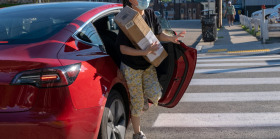- November 12th, 2021
- 0 Comments

According to a new study from engineering and public policy researchers at Carnegie Mellon University, when compared to similar trips made in private vehicles, trips in ride-share vehicles are actually more damaging to the climate and impose a greater cost to society in terms of traffic congestion and public safety.
The researchers gathered public data on rides with Uber, Lyft, and other services in Austin, Chicago, New York, and several cities in California, and used the data to simulate 100,000 trips to paint a representative picture of journey lengths, the time spent in between rides (known as "deadheading"), and the types of vehicles used by drivers.
Despite typically being newer and more fuel-efficient than the average privately-owned passenger vehicle, their research showed that per-trip emissions from ride-share vehicles were about 20% higher than those in personal vehicles.
The main reason for the difference: Deadheading. On average, deadheading accounted for 43% of the total drive time – aka, time spent producing carbon emissions, blocking traffic, and being at risk of accidents that a person driving their own private vehicle would have avoided.
One key metric where taking trips using a ride-share service did beat personal vehicles, however, was air pollution – which the researchers attribute to the burst of pollution created every time a car's engine is started. Previous research has found that cold-start air pollution is roughly equal to driving a car 200 miles, said Jeremy Michalek, one of the study's authors. Since ride-share vehicles run more or less continuously, they essentially avoid that cold-sart air pollution from trip-to-trip.
Read the full article on this CMU research from Quartz here.













